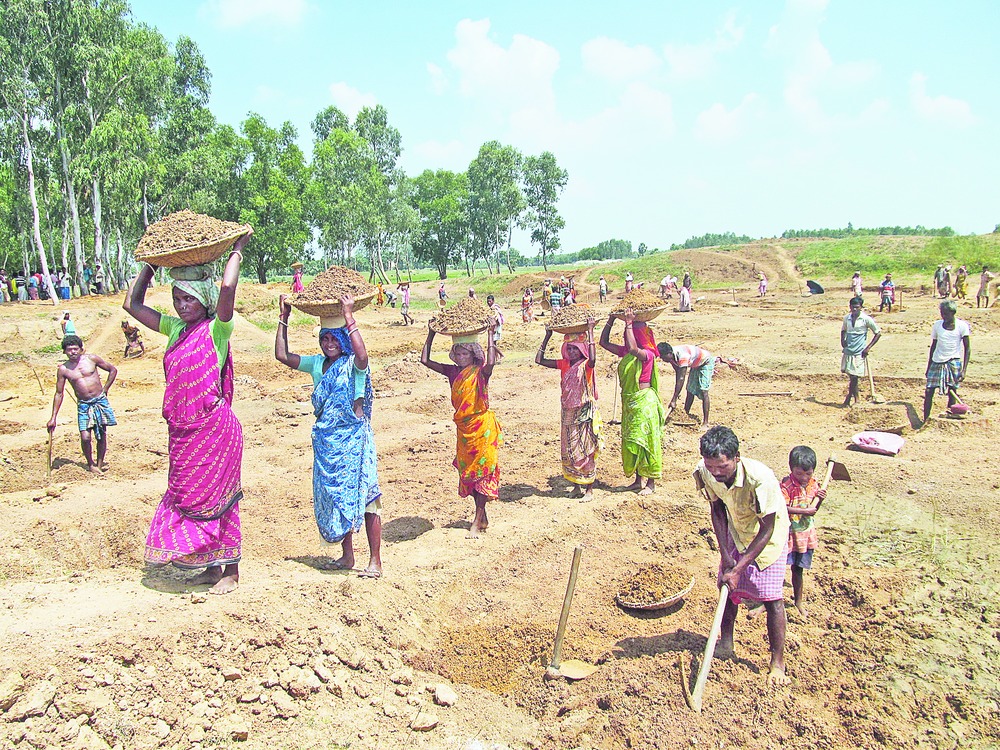To ensure employment in the rural areas, the 100 days’ employment scheme under MGNREGA has been an important tool for governments. Over the past 11-14 months, it has also become the fallback option for the migrant labourers returning to their home states, as restrictions are being newly imposed in the wake of the second wave of Covid19.
For the past few years, West Bengal has topped the list in this scheme of provision of 100 days’ employment. The state government led by Mamata Banerjee has repeatedly performed exceeding the target set in this scheme. Leaving the other states behind, in the last Financial year, West Bengal has generated 41.25 crore days of work, creating an all-time record.
Also Read: Once criticized MGNREGS has helped GOI allocate more work for this April and May
But, unfortunately, despite such a brilliant performance, in the FY 2021-22, the state has been allocated only 22 crore days of work by the Central Rural Development Ministry. The Financial Year began side by side along with the assembly elections. Neither the panchayat officials had taken leave en masse, nor had they wasted their time idly, as the 100 days’ employment scheme has continued with full steam in parallel to the election. But, the centre has not sent money to the exchequer of the state government in this regard.
Inspite of such a problem faced by the state government, the Panchayat minister Subroto Mukhopadhyay has refused to halt his work. He has decided to bring a new momentum in his work, sources revealed. He has planned to hold a meeting with the officers allocated to each of the pilot projects under the state’s panchayati raj division. In this regard, Subroto Mukhopadhyay stated, “Last year we made an all-time record. In the rural economy, 100 days’ work is a key factor. It is in fact a right. Whatever target is given to us in terms of days of work, we surpass it within few months. Last two months, we were caught up with the election.” He further added, “Now, I will take report from the officers and would send a request to the centre regarding allocation of money.”
Last year, one month after the sudden declaration of the unplanned lockdown on March 24, chief minister, Mamata Banerjee used the 100 days’ work scheme for the benefit of the labourers who returned to the state. On her instructions, many migrant labourers who were coming back to the state were brought under the 100 days’ employment scheme. In the last FY, a total of 11, 829,000 people were brought under the umbrella of the 100 days’ employment scheme. A total of 1,296,439 types of works were allotted under the scheme. During the lockdown, the central government was concerned about the speed of work that could have been pulled up by the scheme. Officers were also sent to the state to carry out audit of the various works being performed under the scheme. But, in matters related to allocation and releasing of money to a state performing well beyond the set target, the centre has always developed cold feet. Ideas like fiscal federalism go to the dustbin in such scenarios.
Also Read: Results of Covid19 crisis, O2-deficit, & West Bengal election defeat- Denigration & rift within BJP
The ruling dispensations at the centre and the state of West Bengal are different, and this difference has always been used by the centre to block money owed to the eastern state, whether it was regarding payment of GST dues, relief fund for Amphan cyclone, or the 100 days’ work scheme. Even if money was sent, it was meagre with respect to the size of head in the ledger under which the funds were to be used. The state was provided a minuscule sum of Rs 1000 crore when Amphan made devastating landfall in the state, which suffered a huge loss, with permanent loss of livelihood for many people. At that time, the centre owed the state GST dues which amounted to around Rs13000 crore. Despite such obstacles, the performance of West Bengal in dimensions like 100 days’ work, GST revenue collection, percentage contribution to the growth of GDP, health sector, nutritional metrics and women education has been enviable with respect to other states.





